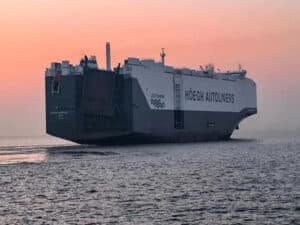
ABS leads innovative BlueBARGE cold ironing project
Written by Nick Blenkey
Group photo from the kick-off event for the BlueBARGE Project. [Photo: ABS]
ABS is leading the BlueBARGE Project. Funded by the Horizon Europe program, it involves 14 partners from 10 European countries and is developing and testing a new way for ships docked in port to plug into electrical power, known as cold ironing, rather than using their onboard generators.
Other BlueBARGE consortium members are: Fundación Valenciaport, Norges teknisk-naturvitenskapelige Universitet; Hydrus Advanced Consolidated Engineering Services S.A; Aalborg Universitet; Elkon Elektrik Sanayi ve Ticaret A.Ş; Regbes B.V.; Multimarine Services Ltd; Corvus Norway AS; Magellan Circle – European Affairs Consultancy, Lda.; Danaos Shipping Co. Ltd.; Enerox GmbH and Columbia Shipmanagement Ltd.
ABS will support the 36-month, EUR 11 million cold ironing project, which is backed by EUR 8.4 million of EU funding, on safety, classification and regulatory compliance.

To limit local pollution and greenhouse gas emissions, the BlueBARGE model will look at an offshore supply of electrical power to moored and anchored vessels. It will address challenges related to electrical integration, platform interfacing with ships, ports, and local networks, as well as operational safety and regulatory compliance aspects.
According to Fundación Valenciaport, BlueBARGE will follow a modular, scalable, adaptable and flexible design approach that will facilitate its commercialization by 2030. It will also address the issues of power supply integration, interconnection of the barge with ships, the port and the local power grid, as well as operational safety and regulatory compliance. In this way, it will offer a complete, high-availability power supply solution.
Among its main advantages is the speed with which it can be deployed in different locations as required. This reduces the need for time-consuming and costly infrastructure upgrades, especially in ports and harbour anchorage areas.
One of the most innovative points of BlueBARGE is the introduction of a novel hybrid concept that will combine the higher energy density of lithium (L-ion) batteries with the innovative vanadium redox flow battery (VRFB) solution, which introduces increased safety and service life.
The proposal will not only serve ships at anchor, including containerships, tankers and cruise ships, but will also be able to supply power to vessels moored in spaces where OPS (onshore power supply) infrastructure deployment is limited or unavailable. In this way, it will be able to ensure the supply of energy in areas with difficult access where the supply from the port’s electricity grid is limited.
The project includes the completion of a feasibility study, the formulation of a sound operational strategy and business plan and the identification of possible sources of financing. A small-scale prototype will also be developed and tested in a real controlled environment.
In this project, Fundación Valenciaport will contribute its experience in port operations, risk assessment of the use of alternative fuels and the implementation of OPS systems in port and will lead the work package focused on the evaluation and optimization of the performance of the barge design.




